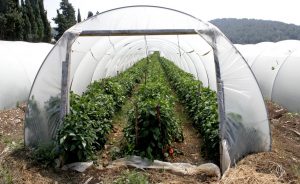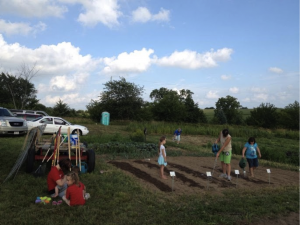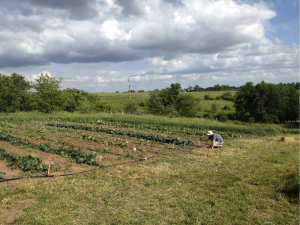Bountiful Hope Farms in Monroe, WI, was awarded a FruitGuys Community Fund grant of $2,750 in April 2014 for the installation of a drip irrigation system, hoop house construction, and printing of outreach materials, which has expanded their operation, brought more fresh produce to local food pantries, and inspired others.
From Farm to Food Pantry: Bountiful Hope Farms
 Food pantries have long been considered providers of only nonperishables such as canned goods and dried goods to those in need. But organizations like Bountiful Hope Farms are challenging that perception. For the past five years, Bountiful Hope has been making sure that those in need of food also have access to fresh produce and eggs through their local food pantries.
Food pantries have long been considered providers of only nonperishables such as canned goods and dried goods to those in need. But organizations like Bountiful Hope Farms are challenging that perception. For the past five years, Bountiful Hope has been making sure that those in need of food also have access to fresh produce and eggs through their local food pantries.
“Our goal is to grow and donate high quality produce to local food pantries while encouraging community gardeners to grow extra and donate it. We have seen incredible growth in the community donations where we have focused our outreach efforts,” says Melissa Burch, who co-founded the farm in 2009 as a nonprofit organization dedicated to addressing food insecurity in low income communities of rural and urban Wisconsin. “For example, when we began donating in 2009, we were essentially the only produce donated. By 2013, our donations remained consistent, but were one third of the total received because the community gardeners are extremely generous and dedicated to the cause of feeding the hungry.”
In 2014, Bountiful Hope Farms was able to expand its operation when The FruitGuys Community Fund awarded the organization a $2,750 grant. The money paid for the purchase and installation of a drip irrigation system throughout the entire garden, six hoop house raised beds, and three cold frames which, are placed on raised beds to trap heat and shelter plants with a transparent lid that admits light, as well as outreach materials such as flyers, brochures, and business cards.
“The drip irrigation system funded by The FruitGuys Community Fund grant made it possible to expand and provide more produce to those in need. We have donated almost 7,000 pounds of produce to nine food pantries and one food bank,” says Burch. “We are so very grateful for the grant; it wouldn’t have been possible without it. ”
Prior to the grant, Bountiful Hope relied on manual watering, which was labor intensive and limited their ability to expand their planting area. Drip irrigation systems significantly lower water usage and reduce soil runoff by efficiently delivering water to the roots of plants. The addition of the hoop house, raised beds, and cold frames will allow Bountiful Hope to extend their growing season and increase yields for donation. Last but not least, the outreach materials have allowed them to highlight their sustainability efforts and reach out to the community for support.
As food pantries increasingly move beyond providing short-term supplies of food and water to confronting chronic hunger and poor nutrition, the importance of supplying children, families, adults, and senior citizens with fresh fruit and vegetables continues to grow.
Bountiful Hope produces typical garden crops grown in the Midwest including, corn, potatoes, peppers, beets, chard, spinach, beans, peas, tomatoes, lettuce, kale, cucumbers, onions, squash, radishes, and turnips. All of the farm’s produce is donated to local food pantries. They rely solely on volunteers to harvest and deliver the produce to food pantries on the appropriate days for distribution. A significant amount of coordination takes place in order to calculate need and ensure that food pantry clients claim all the donated produce so there are no leftovers, as most food pantries have limited storage space, especially for items that require refrigeration. Burch says they “donate as wide a variety [of produce] as possible to ensure that everyone finds something they like among the donation packages we provide.”






